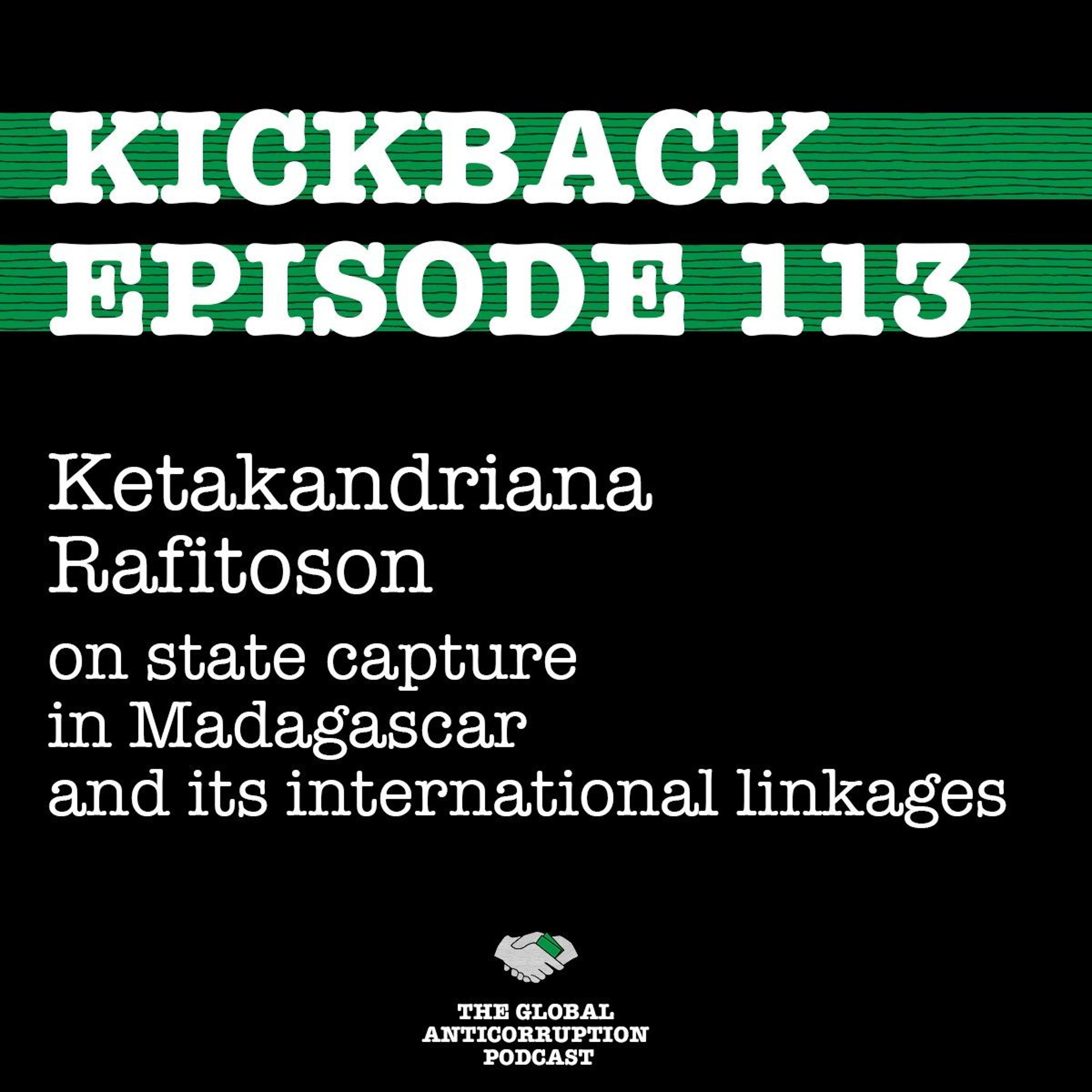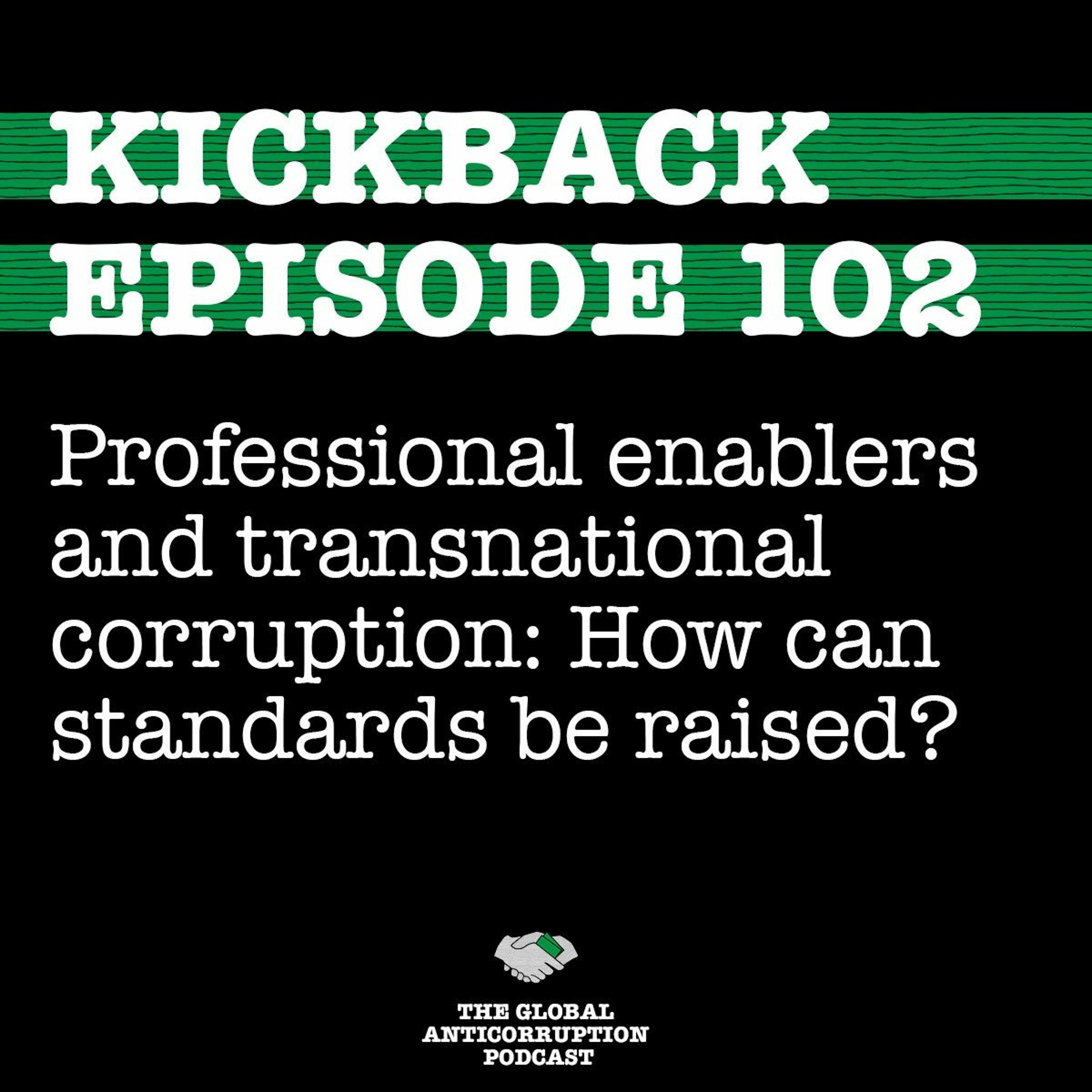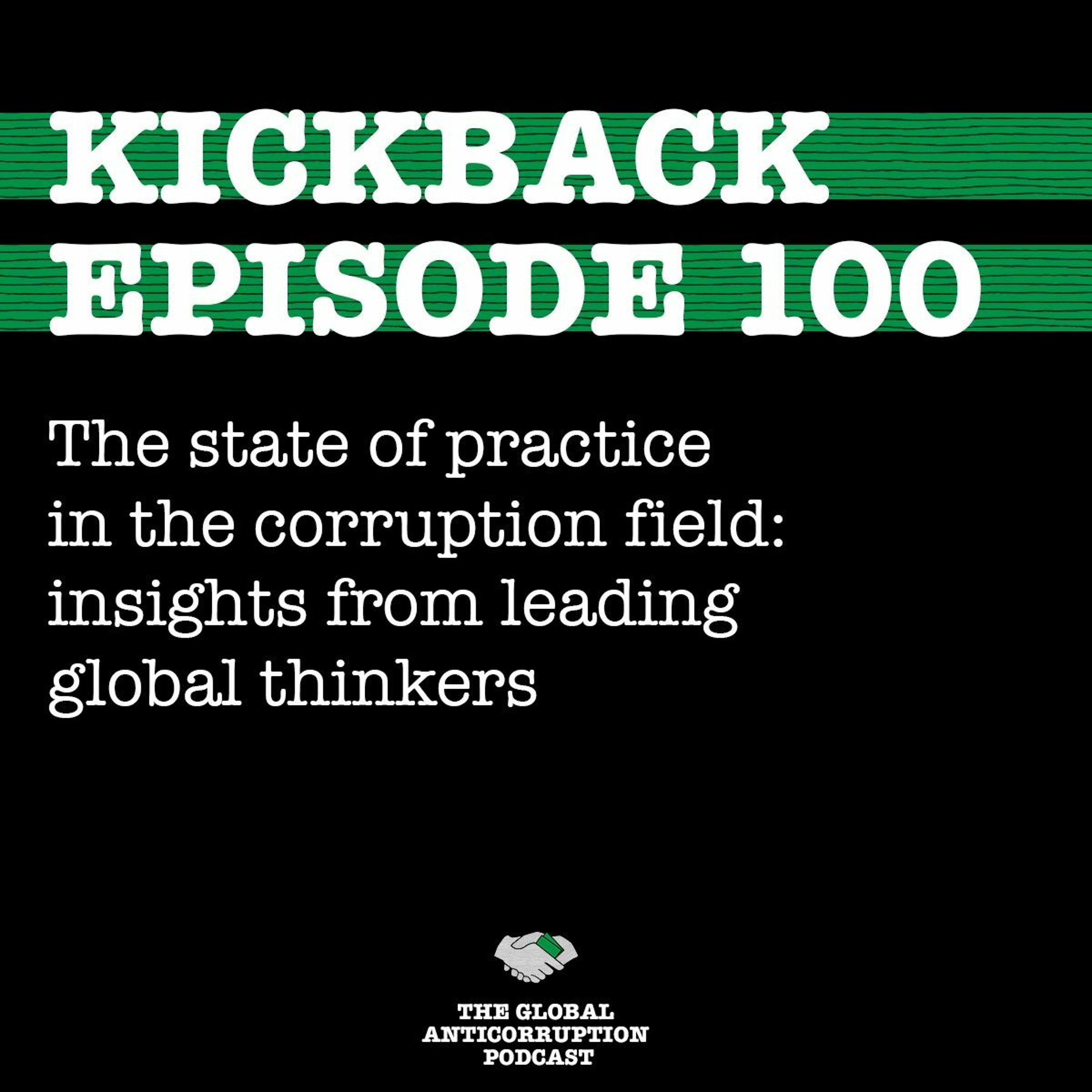Discover KickBack - The Global Anticorruption Podcast
KickBack - The Global Anticorruption Podcast

KickBack - The Global Anticorruption Podcast
Author: KickBack
Subscribed: 87Played: 2,476Subscribe
Share
© All rights reserved
Description
This podcast series features in-depth interviews with a wide range of corruption experts, on questions such as:
What have we learned from 20+ years of (anti)corruption research?
Why and how does power corrupt?
Which theories help to make sense of corruption?
What can we do to manage corruption?
How to recovery stolen assets?
What have we learned from 20+ years of (anti)corruption research?
Why and how does power corrupt?
Which theories help to make sense of corruption?
What can we do to manage corruption?
How to recovery stolen assets?
118 Episodes
Reverse
Many anti-corruption initiatives disseminate messages about corruption and its harms but how can these messages be framed to ensure they are effective? To explore this and related questions Caryn Peiffer (Associate Professor of Public Policy at the University of Bristol) and Nic Cheeseman (Professor of Democracy and International Development at the University of Birmingham) join us on the podcast to discuss their research.
They share research findings which challenge some of the assumptions widely held about the benefits of anti-corruption messaging campaigns. The episode is also full of practical guidance for practitioners, with Caryn and Nic encouraging all involved in these campaigns to think carefully about how they tailor and target their messages.
The main paper discussed by Caryn and Nic can be found here: https://url.uk.m.mimecastprotect.com/s/3b71Cl7MzHYWMNJuGfoCzYaB6?domain=cipe.org/
The U.S. Foreign Extortion Prevention Act (FEPA) is a groundbreaking piece of anti-corruption legislation which makes it a crime for any foreign official to demand or accept a bribe from an American or American company, or from any person while in the territory of the United States. Our two guests, Tom Firestone, Partner at Squire, Patton and Boggs, and Scott Greytak, Director of Advocacy at Transparency International US, played a critical role in getting the act into law.
In the episode, they speak to Liz Dávid-Barrett (Centre for the Study of Corruption) about the scope of the act and how it relates to the Foreign Corrupt Practices Act (FCPA). The three also debate some of the likely challenges around enforcing FEPA as well as the effect the law may have on enforcement efforts by other countries.
For more background on the act, here is a helpful explainer written by Scott - https://www.transparency.org/en/blog/us-foreign-extortion-prevention-fight-against-global-corruption
This episode unpacks the problem of sexual corruption and how to design effective policy responses to it. Our two guests are Associate Professor of Public Policy, Anna Petherick, who is based at the Blavatnik School of Government, University Oxford, and is also the Director of the Lemann Foundation Programme at the school, and Dr. Ortrun Merkle, Research Fellow at United Nations University-Maastricht Economic and Social Research Institute.
Anna and Ortrun are specialists in this topic and also work on the broader theme of gender and corruption. They talk through how the literature has evolved over the last two decades and particularly debates on conceptualizing the problem of sexual corruption. Both also provide useful guidance on how to research these extremely sensitive issues and offer their thoughts on the policy responses available.
Here are some links to writing on this topic by Anna, Ortrun and others if you are looking for further reading.
The Chandler Papers: Sexual Corruption, (by Anna, Monika Bauhr and Bolaji Owasanoye) -https://www.bsg.ox.ac.uk/research/publications/chandler-papers-sexual-corruption
A gender perspective on corruption encountered during forced and irregular migration (by Ortrun, Julia Reinold and Melissa Siegel) - https://www.giz.de/de/downloads/giz2017_eng_Gender-perspective-on-corruption-encountered-during-migration.pdf
Sexual corruption is abuse of power - and there's more to it than 'sextortion' alone (by Elin Bjarnegård, Dolores Calvo, Åsa Eldén and Silje Lundgren) - https://www.u4.no/blog/sexual-corruption-is-abuse-of-power-and-theres-more-to-it-than-sextortion-alone
Bribe to survive: sextortion and LGBTQ discrimination (by Victoria Abut) - https://globalanticorruptionblog.com/2022/06/13/bribe-to-survive-sextortion-and-lgbtq-discrimination/
Professor Lucio Picci (University of Bologna) speaks to Professor Liz Dávid-Barrett (Centre for the Study of Corruption) about his recent work on rethinking the current anti-corruption paradigm.
Lucio argues for the field to pay more attention to potential 'side effects' from anti-corruption discourse, particularly when this agenda is hijacked by populists to support political goals. Lucio uses cases from Brazil, Russia and the United States to illustrate his points. The conversation also takes in Lucio's early work on measurement, including bribery by firms and corruption at subnational level.
Here is a link to Lucio's new book: https://www.cambridge.org/core/books/rethinking-corruption/7556EA509B03B16334D5962113889FF6
And the article discussed on corruption in the management of public works authored with Miriam Golden: https://www.elgaronline.com/edcollchap/1845422422.00026.xml
Emmanuel Mathias, Head of the Governance and Anti-Corruption Division at the International Monetary Fund (IMF), speaks to Prof. Liz Dávid-Barrett (Centre for the Study of Corruption). He discusses the main pillars of the IMF's 2018 Framework for Enhanced Engagement on Governance, providing insights on how the fund approaches its anti-corruption work.
The framework can be found here:
https://www.imf.org/en/Publications/Policy-Papers/Issues/2018/04/20/pp030918-review-of-1997-guidance-note-on-governance
And the review discussed by Emmanuel can be found here:
https://www.imf.org/en/Publications/Policy-Papers/Issues/2023/04/11/Review-of-Implementation-of-The-2018-Framework-for-Enhanced-Fund-Engagement-on-Governance-532166?cid=pr-com-PPEA2023015
In this latest chapter on state capture, Ketakandriana Rafitoson (Vice-Chair, Transparency International; Executive Director of Transparency International Initiative Madagascar) outlines how this problem manifests in Madagascar and the harms caused. She speaks to Tom Shipley (Researcher, Centre for the Study of Corruption) about how state capture has unfolded in key sectors, including in the exploitation of natural resources, and the role that international firms and states have played. Ketakandriana also describes the innovative approaches civil society have taken to fighting back against networks of corrupt actors.
Further information on the case in the lychee sector mentioned by Ketakandriana can be found here, https://www.transparency.mg/telechargements/assainir-la-gouvernance-de-la-filiere-litchi-afin-den-exploiter-pleinement-le-potentiel/
The report on international enablers, 'loophole masters' can be found here, https://www.transparency.org/en/publications/loophole-masters
John Penrose MP, the former UK government Anti-Corruption Champion (2017 - 2022), joins us for this episode. He speaks to Professor Robert Barrington (Centre for the Study of Corruption) about the lessons learnt from his time in the role. This includes taking us behind the scenes to understand what the role of the government Anti-Corruption Champion entails. John also discusses the major developments and drivers behind UK anti-corruption policy during this period as well as some of the key moments, including his decision to stand down from the role during Boris Johnson's administration. John and Robert finally look to the future to consider what the UK's anti-corruption infrastructure could and should look like in the years to come.
The journalist Tom Burgis speaks to Prof. Liz Dávid-Barrett about his work investigating corruption across different continents. Tom talks about he got into journalism and what goes into researching these books. His books cover what Tom calls the rise of kleptocracy since the end of the Cold War. The latest - Cuckooland - grapples with some of the challenges for journalists in scrutinising public figures in a 'post-truth' society.
Richard Nephew, the US Department of State's Coordinator on Global Anti-Corruption, speaks to Liz Dávid-Barrett (Centre for the Study of Corruption) about the US strategy on countering corruption. The episode explores some of the aims and practicalities involved in implementing different pillars of the strategy, including attempts to strengthen the multilateral anti-corruption architecture. Richard and Liz also talk about the key outcomes to emerge from the recent UN Conference of the States Parties to the United Nations Convention against Corruption (UNCAC), hosted in the US.
Below are links to some of the key documents discussed in the episode.
US Strategy on Countering Corruption: https://www.whitehouse.gov/wp-content/uploads/2021/12/United-States-Strategy-on-Countering-Corruption.pdf
Strategy Implementation Plan: https://www.state.gov/wp-content/uploads/2023/09/U.S.-Strategy-on-Countering-Corruption-Implementation-Plan-9.5.2023-FINAL.pdf
Fact Sheet on the Strategy: https://www.whitehouse.gov/briefing-room/statements-releases/2021/12/06/fact-sheet-u-s-strategy-on-countering-corruption/
In this episode Gretta Fenner (Managing Director, Basel Institute on Governance) and Daniel Eriksson (CEO, Transparency International) talk to Liz Dávid-Barrett (Centre for the Study of Corruption) about the links between corruption and national security issues. The episode follows from the Munich Security Conference where Daniel and Gretta raised the issue of corruption as a key policy concern. The group discuss the new global context of heightened insecurity and the implications this has for those working to counter corruption.
Liz also asks Daniel and Gretta about "strategic corruption", defined in the US Strategy on Countering Corruption as "when a government weaponizes corrupt practices as a tenet of its foreign policy". This is a term which has gained significant policy attention. It however raises questions as to whether using the term involves anti-corruption campaigners "picking sides" in this new context of global insecurity .
Alison Taylor, Clinical Associate Professor at NYU Stern School of Business, speaks to Prof. Dan Hough (Centre for the Study of Corruption) on the topic of business ethics.
Alison talks about her early career investigating corruption by businesses before she moved into the broader space of corporate responsibility and business ethics. Alison describes the impact of international anti-bribery laws on businesses but also raises some questions about the corporate compliance regimes these laws have created.
Alison's new book, Higher Ground: How Business Can Do the Right Thing in a Turbulent World, looks at these and other critical questions around ethics for businesses.
In this episode, Liz Dávid-Barrett, Becky Dobson-Phillips and Dan Hough (all Centre for the Study of Corruption) talk through some of the key considerations involved in defining corruption. They begin by discussing the strengths and limitations of the mainstream public office centred definition of corruption developed by Joseph S Nye (see below). Becky then introduces a new conceptual framework for defining corruption in context. This covers different dimensions to corruption, including notable contemporary manifestations.
Aimed at students new to the study of corruption, this is the latest in Kickback's series providing introductions to important debates in the corruption field. Similar episodes on corruption theory (Episode 98) and corruption measurement (Episode 93) can be found in the tracklist.
A link to the paper discussed can be found here: https://www.sussex.ac.uk/webteam/gateway/file.php?name=csc-wp-series-dobson-et-al-defining-corruption-final.pdf&site=405
For reference, the Nye definition of corruption is as follows
“Behaviour which deviates from the formal duties of a public role because of private regarding (personal, close family, private clique) pecuniary or status gains; or violates rules against the exercise of certain types of private-regarding influence.” (Nye 1967)
Continuing our chapter on kleptocracy and state capture, this episode features Sankhitha Gunaratne, Deputy Executive Director of Transparency International Sri Lanka. She speaks to Liz David-Barrett (Centre for the Study of Corruption) about TI's work to combat state capture in the country.
The recent economic crisis in Sri Lanka has laid bare the extent to which kleptocratic actors have captured key pillars of the state. Sankhitha describes the different tactics used, including the suppression of accountability institutions and militarisation of key government positions. She then outlines TI's response, which has included the use of strategic litigation and leveraging the influence of international financial institutions.
There are lots of lessons here for understanding how state capture develops and how it is possible to fight back.
Daniel Freund is a Member of the European Parliament and former Head of Advocacy for European Union Integrity at Transparency International. In this episode he speaks to Prof. Dan Hough about the different dimensions to the EU's fight against corruption.
The discussion starts with the struggle to protect EU institutions from undue influence, a problem illustrated by Qatargate, a lobbying scandal Daniel describes as the "tip of the iceberg". Daniel also discusses challenges in building institutional resilience to corruption within potential accession countries as well as EU member states themselves. This includes thinking through some of the key challenges, such as how should the EU be responding to autocratic regimes like Viktor Orbán's government in Hungary?
Dr. Andreas Bågenholm (University of Gothenburg) and Dr. Rekha Diwakar (University of Sussex) join Prof. Dan Hough to discuss anti-corruption political parties. These parties have proliferated in different parts of the world in the last two decades. Andreas and Rekha draw on their research in Europe and India respectively to talk about where these parties come from and what they stand for. The group then look at how these parties have actually performed when they have entered into government, assessing in particular the track record of the Aam Aadmi Party (AAP) in Delhi. We learn how these parties tend to evolve over time and can even become caught up in accusations of corruption involving their own members.
In this episode Professor Dan Hough (Centre for the Study of Corruption) speaks to Professor Robert Klitgaard (Claremont Graduate University). Robert is a well-known and influential academic in the corruption field. He talks us through the origins of his ideas in applying institutional economic theory to understanding corruption issues, as originally set out in Controlling Corruption (1988). Robert then discusses other research interests and influences, including the anthropological literature on corruption and challenges related to elitism in developing and developed countries. Robert and Dan lastly talk about Robert's recent research in Bhutan and the lessons it might hold for other countries pursuing anti-corruption reforms.
Details on Robert's previous and upcoming publications are available here: https://www.cgu.edu/people/robert-klitgaard/
In episode 102 Robert Barrington (Centre for the Study of Corruption), Guy Beringer KC (Hon) (Chair of the Taskforce on Business Ethics and the Legal Profession), Liz Dávid-Barrett (Centre for the Study of Corruption) and Tena Prelec (University of Rijeka) discuss the topic of so-called 'professional enablers'. Distinguishing between legal and illegal functions, the group discuss the types of activities related to corruption that the term might (and might not) encompass. They provide plenty of case examples from around the globe involving different types of professionals, such as accountants, consultants and lawyers. There is then a particular focus on the legal profession and the pathways available for raising professional standards. This includes a discussion some of the legal ethics issues raised by this topic.
Leading academics from the Centre for the Study of Corruption sit down to discuss what we learnt from Episode 100. The anniversary episode featured insights on the state of anti-corruption practice from some of the leading global thinkers in the field.
Here, Robert Barrington, Liz Dávid-Barrett, Dan Hough and Sam Power debate some of the key questions raised, including:
To what extent we should be optimistic about the future for anti-corruption work?
What is the proper place for corruption theory in understanding key developments in the field?
And what are the roles that different groups of actors can play in the next phase of anti-corruption initiatives?
For this special anniversary episode, Kickback invited leading thinkers from around the globe to comment on the state of practice in the corruption field. We asked each individual to respond to one of two questions:
a) 'what is one thing about corruption that you've changed your thinking on in the past 10 years?'
b) 'what is the most significant development - positive or negative - in relation to corruption and corruption studies over the past thirty years?'
We got some fascinating responses. Take the time to listen to them all in or jump to an individual's comments from the links below. Here are our esteemed contributors:
Michael Johnston (2.34) - https://on.soundcloud.com/EM7ED
Leena Koni Hoffmann (7.52) - https://on.soundcloud.com/HbLSy
Alina Mungiu-Pippidi (10.24) - https://on.soundcloud.com/RXYf2
Paul Heywood (12.51) - https://on.soundcloud.com/dA5Hg
Florencia Guerzovich (15.40) - https://on.soundcloud.com/6sbPW
Joseph Pozsgai-Alvarez (18.16) - https://on.soundcloud.com/Q54rJ
Jorge Alatorre (21.36) - https://on.soundcloud.com/yk8qf
Delia Ferreira Rubio (23.33) - https://on.soundcloud.com/ojHVn
Matthew Stephenson (26.55) - https://on.soundcloud.com/AwQ1Z
Susan Rose-Ackerman (29.43) - https://on.soundcloud.com/9H4m3
John Githongo (32.15) - https://on.soundcloud.com/fzfjn
Jon Quah (33.34) - https://on.soundcloud.com/mdSgr
Laode Muhammad Syarif (36.12) - https://on.soundcloud.com/gu2mC
To see categories of past episodes, go to our playlists page - https://soundcloud.com/kickback-gap/sets
Huma Yusuf speaks to Tom Shipley about the links between business integrity and environmental, social and governance (ESG). Huma is Director of Business Integrity at British International Investment, an impact investor, and a key public commentator on climate change in Pakistan. In this podcast, Huma describes how anti-corruption and business integrity fit into the global business agenda on ESG, breaking down some of the key concepts and debates in this area. She also talks about working with businesses in emerging markets on these topics and some of the key challenges that arise.
Links to reports cited in the podcast are here:
Transparency International (2022) "Investing with integrity",https://www.transparency.org.uk/sites/default/files/pdf/publications/Investing%20with%20Integrity%20-%20Transparency%20International%20UK.pdf
World Economic Forum (2022) "Investing in integrity in an increasingly complex world: the role of anti-corruption amid the ESG revolution", https://www3.weforum.org/docs/WEF_Investing_in_Integrity_GFC_2022.pdf
Top Podcasts
The Best New Comedy Podcast Right Now – June 2024The Best News Podcast Right Now – June 2024The Best New Business Podcast Right Now – June 2024The Best New Sports Podcast Right Now – June 2024The Best New True Crime Podcast Right Now – June 2024The Best New Joe Rogan Experience Podcast Right Now – June 20The Best New Dan Bongino Show Podcast Right Now – June 20The Best New Mark Levin Podcast – June 2024
 United States
United States























I think episode 0 is deleted or somehow have a problem. I cannot download it or listen to it while I downloaded episodes 1 and 2 successfully. BTW thank you for good content you provided!
The common way to standardise is incidents per thousand which ‘disadvantages states like Wyoming over California’. Apparently. Otherwise an interesting topic with some insight into the complexity of measuring Criminal Justice